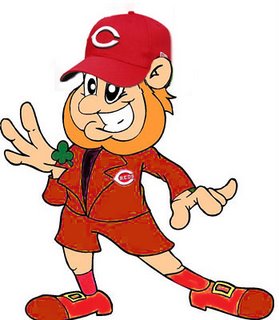 When Ryan Freel's ancestors came from Ireland, they, like other immigrants with the dreams of better lives in America, had packed up the whole of their belongings in trunks and suitcases and boarded ships destined for a land where the streets were paved with gold. There wasn't much in these packages other than hope and dreams, but in America, you could find jobs, and no one ever went hungry. They had exotic trees in this America, trees with milk and honey and meat and money, all ready for anyone to pick and eat and enjoy.
When Ryan Freel's ancestors came from Ireland, they, like other immigrants with the dreams of better lives in America, had packed up the whole of their belongings in trunks and suitcases and boarded ships destined for a land where the streets were paved with gold. There wasn't much in these packages other than hope and dreams, but in America, you could find jobs, and no one ever went hungry. They had exotic trees in this America, trees with milk and honey and meat and money, all ready for anyone to pick and eat and enjoy.Times were rough on the Emerald Isle, rough for everyone, (excluding, of course, the British, who had plenty of food and religion to go around.) L. Farnsworth O'Spunk, too, was down on his luck. The British had decided that they hated rainbows and had banned them, so leprechauns like Farnsworth could not find the way to their gold, driving them to poverty like the regular-sized Irish. Farnsworth, like so many of his fellow countrymen, grew weary of the pain in his barren belly, so he packed up everything he owned and set off for the United States of America.
When Farnsworth disembarked at Ellis Island, even his hopes and dreams could not compete with the massive Manhattan skyscrapers he saw across the water. Yes, he thought, this is Heaven, isn't it? A single tear came to his eye as he stared up at these edifices of steel and concrete, testament to the tenacity and perseverance of man. And the sky was so blue! In Ireland, even blue skies were peppered with a gray pestilence of clouds that constantly reminded him of his wretched situation there. The Romans had called the island "Hibernia," which meant "Land of Eternal Winter." Farnsworth had always thought that appropriate, for it spoke volumes about the oppresive gloom of Irish misery at that time.
America, however, did not turn out to be the Arcadia he had envisoned. Everywhere he went to get a job, he saw signs saying, "Irish Need Not Apply." He had no money and no place to stay, so he slept on park benches until cops would come and shoo him away, Irish cops who had already forgotten what it was like to be an American newbie, whose violent corruption disgusted him and sent him futher into despair.
After months of struggling to survive, Farnsworth had had enough. Stealing a bottle of whiskey from a pub in the East Village, he slowly made his way to the Brooklyn Bridge. As he sat on the edge of the bridge drowning his sorrows and staring at the river below him, he took one last look at the magnificent skyscrapers of Wall Street, cursed the soulless rich cogs who worked there, and took a deep breath.
Suddenly, he was approached by a young lad of about 14, an Irish boy with curly hair and a lust for life in his eye.
"Whatcha doin'?" he asked in all innocence.
"Killin' meself, lad. Leave me to it."
"Why would ya do that?"
"I've got me no reason to live."
"Well, what about your kids?"
"Kids? I don't have kids."
"Don't you want them? Someone to carry on your name?"
"What's the use? They'd just grow up in poverty."
"Nah, that's the great thing about America. You can always make the world better for your kid."
"Astute little bugger," Farnsworth said to himself. But maybe the kid is right? "How do you know so much, kid?"
"My dad told me so. When he came to America, he only had the clothes on his back. But he didn't give up, and now we have a nice little apartment all of our own and enough food for three square meals every day."
"What's your name, kid?"
"William Freel. Hey, if you want, you can stay in my room for awhile. My mom won't mind."
And with that, Farnsworth and William became best friends. They were each other's best man at their weddings, and they grew old together. They even died within days of each other.
Now, Farnsworth looks down at his family from Heaven with the widest of grins, for his great great great grandson, Farney, has achieved the ultimate American dream: He has become a big league baseball player. And the best part of it all? Farney gets to play along side William's great great great grandson, Ryan.

No comments:
Post a Comment